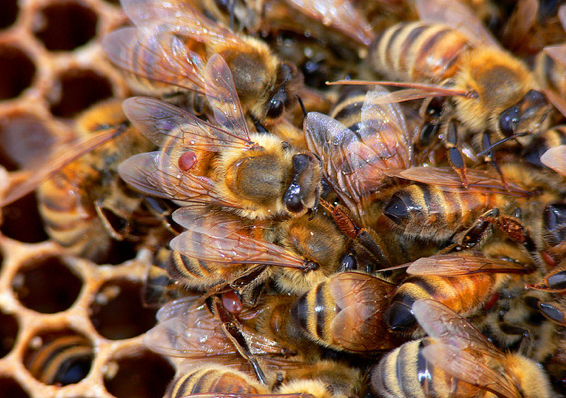Gardens and fields are a lot more silent this year with continually declining populations of honeybees and other local pollinator species, but University of Wisconsin and City of Madison officials are abuzz with new ideas to bring back these key ecosystem helpers.
UW Arboretum native plant gardener Susan Carpenter said when people think of pollinators, their minds often jump to honeybees. Wisconsin has over 400 species of bees and even more alternative pollinator species contributing towards agriculture, home-gardens and overall ecosystem health, Carpenter said.
According to the Department of Trade, Agriculture, and Consumer Protection, pollinators contribute upwards of $55 million in annual production benefits for agricultural crops in Wisconsin alone.
But despite the major benefits pollinators provide, the future doesn’t look so bright for either honeybees or local pollinators.
A 2013 report by the US Department of Agriculture found native bee populations fell 23 percent between 2008 and 2013 across the US. Wisconsin was also one of the few states to experience a honeybee decline of over 60 percent in the 2014-15 winter season according to the DATCP report.
Dane County hires first director of new Office of Energy and Climate Change
As a public educator, Carpenter said the solution begins with a conversation on the importance of pollinators and some simple steps community members can take to both minimize pollinator loss and rebuild pollinator communities.
“My approach is helping people see things that they maybe haven’t seen before, what maybe has always been right there in front of us, but we’ve never really looked at it yet,” Carpenter said.
Carpenter finds the development of community-based models of environmental protection very rewarding, but she also realizes there are much larger issues that must be addressed with a system-wide approach.
Agricultural systems are part of the problem for pollinators, Carpenter said. She believes pollinators need a mix of land cover types to create the right habitat conditions.
“Basically you need to have a landscape that can support life,” Carpenter said. “If it’s just agricultural crop as far as the eye can see, then there really isn’t a place for pollinators to live.”
Carpenter said other issues bees face are habitat loss, natural predators, earlier growing seasons, and pesticides, which have become a hot-button issue for farmers, lawmakers and environmental groups alike.
UW professor of entomology Claudio Gratton also echoed Carpenter’s concerns over the issues big agriculture usage can present.
“If you really wanted to point to any one giant thing, it would be agriculture, [it’s] kind of the biggest way humans affect the globe by far,” Gratton said. “The two key things there are the lack of food, the lack of plant diversity in our landscape, and the use of pesticides, broadly, and insecticides, specifically.”
A recent study published in Science this summer highlights the harmful health effects bees can experience from continued exposure to neonicotinoids, a common type of insecticide used by the industry.
But Gratton and Carpenter both agree, however, the solution is to find a compromise between the needs of farmers and pollinators, whose livelihoods are so intricately related.
“I totally agree that farmers ultimately need to stay in business, but I think there’s good ways to do it that don’t hurt the environment,” Gratton said.
Dane County UW Extension Natural Resources & Community Development Educator Mindy Habacker points to a different issue for honeybee and local pollinator populations: garden habitats.
While Habecker admits there are a multitude of issues facing local pollinators, she aims to place focus on community education models to allow citizens to take an active role in an issue that has a large impact on their food and environment.
“I think people knowing that it would not take much for [community members] to do some simple things around their own home [would] really help our pollinators,” Habecker said. “It doesn’t take much effort but they can make a difference.”
Habecker’s goal is to create educational resources like display boards, brochures and informational cards with native plant seeds for educators and community members to learn about the importance of pollinators.
Abuzz about honeybee shortage, Madison establishes bee task force
This initiative is part of a much larger Madison Pollinator Protection Task Force created in 2014, inspired by national action from the federal government.
Director of Food Policy at the Madison Food Policy Council, George Reistad, said the City of Madison has made recent efforts, like the Mayor’s Monarch Butterfly Pledge and Bee City designation, to show their commitment to local pollinator preservation.
“[Madison Food Policy Council] prioritizes this as something that needs to be taken on, and something we can do within our municipal boundaries,” Reistad said. “We’re just a city, but if we don’t do it, who’s going to do it? We lead by example.”
While many of these programs are still in their infancy, Reistad said these efforts are part of a larger goal of the city to increase community awareness of local pollinator issues.
Ultimately, Carpenter said the creation of these initiatives are just the first step in encouraging community members to address Wisconsin’s pollinator plight.
“Everyone seems to want to help pollinators, but people don’t know how they can help,” Carpenter said. “But what I find is if I can show them [local pollinators] in the field … people become motivated and interested in how they can help.”



















